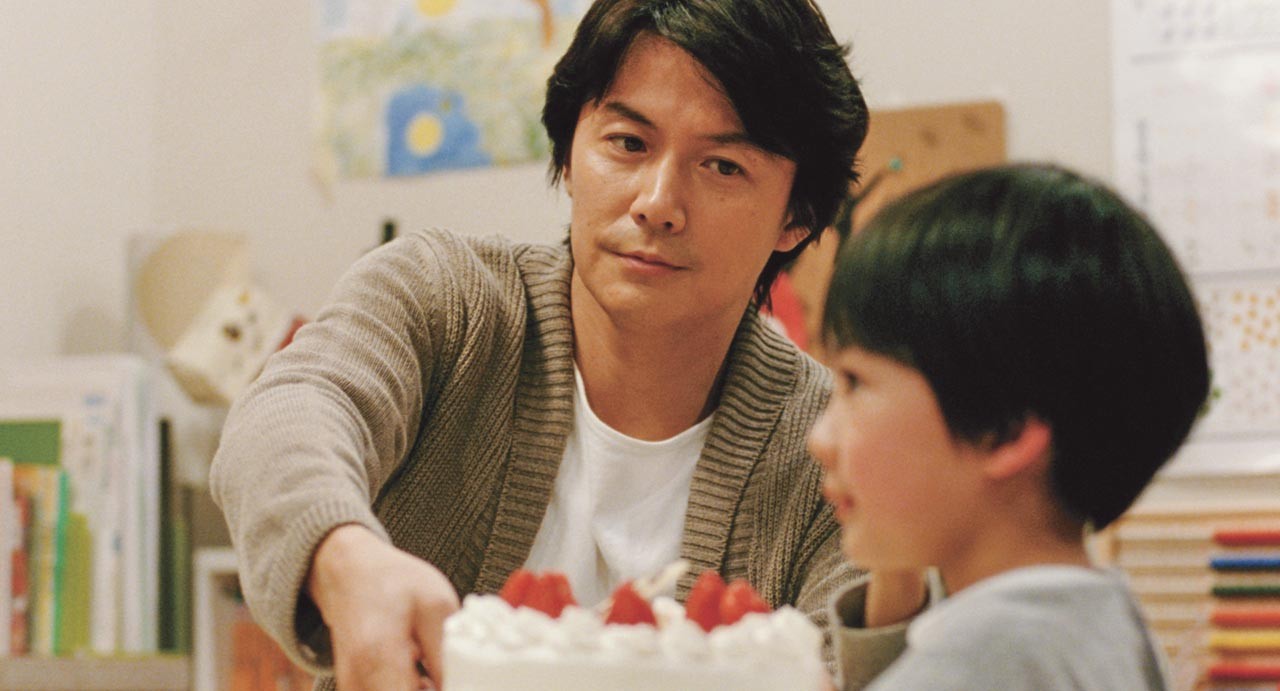Hirokazu Kore-Eda may be the most sensitive filmmaker in the Japanese cinema today. And yet he almost always keeps his characters at arm’s length, in order to study them and their emotions. His scenarios soft-pedal willful perversity in favor of introspection, notably focused on the relentless passage of time. If Kore-eda’s 17 features as a director have a common theme, it is that we’re all in this world together, although the loneliness can prove overwhelming. Each of his films is a gentle inquisition into the mysteries of the human condition.
For the next two weeks at the Berkeley Art Museum Pacific Film Archive we can examine the director and his oeuvre in concentrated doses, in a special series of seven “reprise screenings” of BAMPFA’s In Focus: Hirokazu Kore-Eda retrospective.
If we had to pick one film to exemplify the Kore-Eda approach, Like Father, Like Son might well do the job. The 2013 production, written by the director, shows what happens when a pair of mismatched contemporary Japanese families learns that their now-six-year-old sons were accidentally switched at birth in the hospital.
One of the boys, Keita (Keita Ninomiya), the biological son of an amiably lazy shopkeeper, gets stuck with a humorless prick of an adopted father, a successful and very driven architect. Keita’s counterpart Ryusei (Shôgen Hwang), the actual son of the architect, enjoys a completely different lifestyle with the shopkeeper and his brood, full of hugs and communal bathing and a hang-loose attitude. Naturally we feel sorry for the shopkeeper’s true kid — he deserves his “real” family, not these snooty overachievers. But this filmmaker’s narratives are never as cut and dried as that. Kore-Eda stock company actor Lily Franky (aka Rirî Furankî) costars as the shopkeeper. Like Father, Like Son, as amiable a custody battle as you will ever see portrayed at the movies, screens May 11.
Kore-Eda is frequently likened to the fabled director Yasujirô Ozu, as much for the subject matter they share as for Kore-Eda’s serene, fatalistic observation of families, the ones who grow apart as the years pass and the ones who remain together. Some characters have to wait until they’re dead to realize how precious their lives were, as in After Life, a 1999 semi-sci-fi story that uses non-actors to portray departed souls recalling their most cherished memories. It plays May 5. Death and familial love also play a vital role in the 2008 drama Still Walking, in which a doctor’s surviving family members pay their respects in a rural community while bickering among themselves — a case of gentle manners masking turbulent emotions. Screening May 9.
Some Kore-Eda screenplays have an undeniable social-commentary impulse. The Third Murder comes across at first as a detective story about the killing of a factory owner by a disgruntled employee — but upon further investigation wades out into far deeper emotional waters, to illustrate the perennial adage, “Everyone has his reasons.” Nippon movie heroes Koji Yakusho and Masaharu Fukuyama star. It shows May 18. Last year’s release Shoplifters takes us into Tokyo’s lower depths for the tale of a “family” of strangers — including the title grocery-store pilferers, a peep-show sex worker, and a tough old granny (played in one of her last performances by actor Kirin Kiki) — who band together in their tumble-down shack for no other reason than to persevere in an increasingly costly city no matter what. Kore-eda is not afraid to slip into sentimentality, as this study of urban anomie illustrates. Catch Shoplifters on May 4 and again on May 19.
In choosing only seven of the director’s titles, In Focus: Hirokazu Kore-Eda — a project of Susan Oxtoby, BAMPFA’s Senior Film Curator — necessarily has to leave out one or two must-sees, notably Nobody Knows, the 2004 story of a group of young siblings abandoned in their Tokyo apartment by their footloose mother. It’s a genuine tearjerker. If we were to expand the playlist just a bit, we’d also round up the 2011 divorce drama I Wish, another weepie with juvenile overtones, as well as After the Storm (2016). The latter is perhaps Kore-Eda’s most heart-rending family portrait, the story of a regretful (and chronically irresponsible) divorced father trying to re-connect with his estranged wife and their young son. So many films, so little time. The field of study is wide and rewarding when it comes to Kore-Eda. For updates and copious notes, go to: BAMPFA.org













